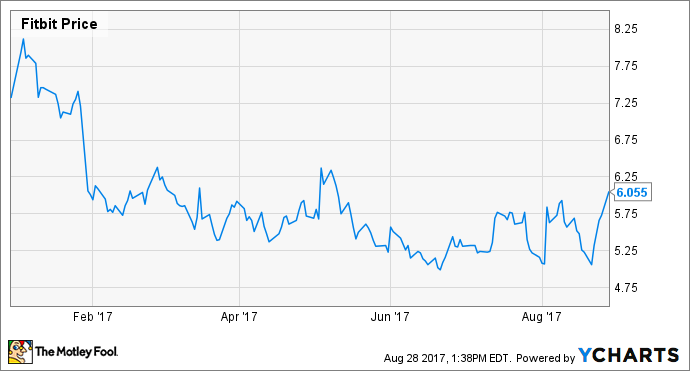It's here: a legitimate smartwatch from the pioneer of the wearable fitness tracker. After a long road of development fraught with reported hang-ups, Fitbit (FIT) released details on the new Ionic yesterday (Monday, Aug. 28). The new device and other supporting releases could be the key to help the company rebound after a couple of years of struggle.
Breaking new ground
The Ionic smartwatch has new features that are a first for Fitbit. In addition to a slew of fitness-tracking updates, including a new blood-oxygen sensor the company expects will eventually be able to detect sleep apnea, Ionic has built-in GPS tracking, water resistance up to 50 meters, contactless payments, the ability to store up to 300 songs, and on-device guided workouts and personalized notifications.

Fitbit's new Ionic smartwatch, displayed in one of three standard colors. Image source: Fitbit.
Those features help Fitbit play catch-up with Apple's (AAPL -1.22%) smartwatch, but perhaps the biggest jump forward is an app store that will also be launching with the watch. Fitbit's previous devices, including the Blaze watch, fell short of bona fide smartwatch status because of the absence of an app store and inability to use third-party applications.
The new store, dubbed Fitbit Gallery, aims to fix this problem. Gallery will include a few popular apps at debut, including Pandora and Starbucks, and will be opened up to all developers in September.

The new Fitbit Flyer wireless headphones for the Ionic watch. Image source: Fitbit.
Alongside the Ionic device is another first for Fitbit: headphones. The Fitbit Flyer wireless headphones give further indication that the company is gunning for Apple, which owns the audio company Beats by Dre. Fitbit said it made the move with its own fitness-centric headphones for its new smartwatch based on company research that showed 64% of fitness tracker owners wanted wireless headphones as well.
The devices will be shipping out sooner than we perhaps thought, based on comments from the second quarter earnings call. Consumers who pre-order the $299.95 Ionic and $129.95 Flyer on Fitbit's website can expect their purchases to ship by the end of September. The devices go on sale at retailers in October.
What it means for Fitbit
The new announcements are much needed for the wearables company. Device sales have been on the rebound the past few quarters, but still down sharply from peak levels.
|
Quarter |
Number of Devices Sold |
Revenue |
|---|---|---|
|
Q1 2016 |
4.8 million |
$505.4 million |
|
Q2 2016 |
5.7 million |
$586.5 million |
|
Q3 2016 |
5.3 million |
$503.8 million |
|
Q4 2016 |
6.5 million |
$573.8 million |
|
Q1 2017 |
3.0 million |
$298.9 million |
|
Q2 2017 |
3.4 million |
$353.3 million |
Chart by author. Data source: Fitbit quarterly earnings.
Management has also enacted cost-cutting plans in the past year, but the company has slipped into unprofitability as it invests to keep up with the change in consumer taste from simple health wristbands to a more comprehensive wearable device. Ultimately, cost cuts won't cut it; Fitbit needs to sell more product.
What it means for investors
The initial reaction to the new device announcements is positive, as shares are up over 5% as of this writing. The Ionic and optional companion headphones, as well as the second-generation Aria smart scale, could provide the much-needed sales boost investors have been looking for.
Data by YCharts.
A few extra sales will make it into the current quarter, which wraps up at the end of September, but don't expect a real impact until the holiday shopping frenzy rolls around.
Ionic could be the shot in the arm Fitbit needs, but the longer-term implications are more exciting. The new device builds on the fact that Fitbit is really a health company, not just a tech device company. The new blood-oxygen sensor could open up new possibilities in health tracking and help the company make more inroads into the healthcare industry, building on its connected health and insurance partnership business it has been building out the past few years.
For the time being, though, the Ionic is attractively priced at $300 -- less than the $369 for Apple's second-gen watch -- and is a big jump forward technologically. The months ahead will be critical for Fitbit, providing the basis for a business rebound or an epic flop that puts the company in serious trouble.






